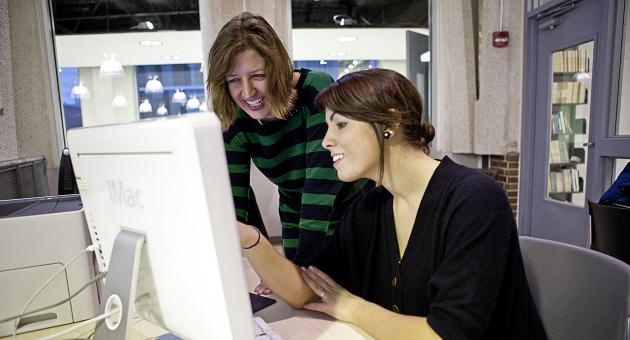Temple faculty experiment with alt-textbooks

Last year, the rising tide of anger and frustration over the costs of college textbooks among students and faculty prompted Steven Bell to design the alternative textbook project, which he piloted this past fall.
“We provided a $1,000 grant to 11 faculty members to ditch the textbook and build their own mix of digital learning materials,” said Bell, associate university librarian at Temple. “We are hoping to demonstrate not only significant cost savings to students, but also learning benefits.”
It appears as though Bell's hopes will not only be fulfilled, but surpassed. Several faculty members found that students embraced their alternative textbooks and thrived because of it.
Kristina Morris Baumli, who teaches first-year writing, assigned the same three research papers that she has always assigned.
“Last semester, the majority of students needed a lot of assistance with their first paper,” she said. “This fall was exactly the opposite. They still did a lot of reading and researching but (the alternative textbook) created a facility with language and research that they didn’t have with the regular text. It’s added a dimension as well as being a substitute.”
Morris Baumli built the architecture for a free e-textbook, comprising primary sources and free online texts that she says other faculty can build on and contribute to.
“Temple has the great Urban Archives, which contains wonderful primary sources, so we had students working on key documents on the struggle for gay rights, including the AIDS struggle,” said Morris Baumli. Her students also used Civil Rights in a Northern City, the libraries’ newest database, to create a research project.
Savings to students? About $107. Benefits to students? Priceless.
“Everything is online, so it’s paperless,” said Morris Baumli. “This saves students the money they’d pay to print, and time they’d spend standing in line at the TECH Center. We’ve set it up so students can do their readings on their phones. It also gives them much better links to the library earlier in their college careers.”
For his "Morality, Law and Advertising class", Keith Quesenberry had been wanting to try an alternative to a textbook for a while, as there’s only one textbook on the subject and it’s outdated.
He pulled together original source material available online, including free briefs on court cases, articles from journals and industry trade publications, and codes and ethical standards published by such groups as the Federal Trade Commission.
“It went really well," Quesenberry reported. “It seemed like the students were more engaged and less burdened, getting to and completing assignments earlier. The textbook was this thing they hated. This removed a barrier for them.”
For Vanessa Yingling, digital alternatives to textbooks are a necessity. The kinesiology professor needs technology to keep her students up to date on the latest research, to stay on top of her own busy schedule and to make all of the course material more meaningful and accessible.
Her alt-textbook, which she combines with alt-lecture, has taken the form of a website through which she uses a wide range of technologies — Jing, Diigo, Twitter and Xtranormal. For difficult-to-grasp concepts, she creates special modules comprised of a voiced-over Powerpoint for students to review on their own time.
“I want them to touch the material many times, which is why I try all of these many different things,” she said.
For some fields there’s no way textbooks are going to be able to keep up. Marketing is all about what’s now, says Whitney Collins. And textbooks can lag behind the current state of knowledge in the discipline.
Collins led her "Intro to Marketing" class in developing their own alternative textbook. Each week, students would find a source on an assigned topic and submit a write-up for the textbook. The next week, a new student would tackle the topic, tightening and adding to the existing material. All of the topics were essential marketing concepts, and sources could be anything from an interview with an expert, to a trip to a museum, to an online article. At the end of the semester, the class used the textbook as reference for the final exam.
“I really believe the future is a text-alternative one, but I'm not exactly sure what that means yet,” said Collins. “This project has provided the opportunity to explore that reality.”
Bell hopes to continue the alternative textbook project and several project participants plan to mentor colleagues this semester. The project is being carried out under the auspices of Temple’s Teaching and Learning Technology Roundtable, or TLTR 2. He realizes that some courses and faculty will always need or want textbooks but knew that it was time to try something different.
“Overpriced textbooks aren't one of the most serious issues confronting higher education, but there's no denying students and faculty want major changes,” said Bell. “Trying something new — we ought to get behind that.”